As professionals in the field of estate planning, we understand the importance of having a comprehensive and legally sound will in place. From the distribution of assets to the appointment of guardians for minors, ensuring that your final wishes are clearly outlined is crucial in avoiding potential disputes and confusion among loved ones. In this article, we will discuss the key elements that should be included in your will to provide a solid foundation for your estate plan. Let us guide you through the intricate process of crafting a will that accurately reflects your wishes and protects your legacy.
Key Considerations for Crafting Your Will
When crafting your will, there are several key considerations that you should keep in mind to ensure that your wishes are carried out effectively. One important aspect to think about is who you would like to name as your executor. This individual will be responsible for managing your estate after you pass away, so it is crucial to choose someone who is trustworthy and capable of handling the responsibilities that come with this role.
Additionally, it is important to clearly outline how you would like your assets to be distributed among your beneficiaries. This includes specifying who will receive what property or funds, as well as any specific conditions or instructions that you would like to include. Taking the time to carefully consider these details can help prevent misunderstandings or disputes among your loved ones in the future.

Protecting Your Assets Through Comprehensive Estate Planning
In your will, you should clearly outline how you want your assets to be distributed after your passing. This includes specifying who will inherit your property, money, investments, and any other valuable possessions. It is crucial to be detailed and specific in your instructions to avoid any confusion or disputes among your beneficiaries.
Additionally, you may want to designate an executor to carry out your wishes and handle the distribution of your assets. This individual should be someone you trust and who is capable of handling the responsibilities involved in executing your will. Make sure to review and update your will regularly to reflect any changes in your financial situation or personal relationships.

Important Decisions to Make When Naming Beneficiaries
When naming beneficiaries in your will, there are several important decisions that need to be made in order to ensure that your wishes are carried out accurately. One key decision to consider is whether you want to designate individuals or organizations as beneficiaries. This choice will depend on your personal circumstances and the relationships you have with potential beneficiaries. It is important to carefully consider who you want to include in your will to ensure that your assets are distributed as you see fit.
Another crucial decision to make when naming beneficiaries is determining the specific assets or percentages of your estate that each beneficiary will receive. This allocation should be thoughtfully considered and clearly outlined in your will to avoid any confusion or disputes among beneficiaries. Additionally, you may also want to consider naming contingent beneficiaries in the event that your primary beneficiaries are unable to receive their inheritance. By making these important decisions now, you can ensure that your estate is handled in accordance with your wishes and that your loved ones are provided for in the future.
Ensuring Your Wishes are Clearly Outlined in Your Will
When it comes to creating a will, it is crucial to ensure that your wishes are clearly outlined to avoid any confusion or disputes among your loved ones. By including specific details and instructions in your will, you can ensure that your assets are distributed according to your wishes and that your loved ones are taken care of after you pass away.
Some important things to consider including in your will are:
- Beneficiaries: Clearly list who you want to receive your assets and how much they should receive.
- Executor: Choose a trustworthy person to carry out the instructions in your will.
- Guardianship: If you have children, specify who will have guardianship over them in your absence.
- Funeral arrangements: Include any specific instructions or wishes you have for your funeral or memorial service.
Q&A
Q: What are some important items to include in my will?
A: It’s crucial to include details about your assets, such as property, investments, and personal belongings. You should also designate beneficiaries and specify how you want your estate to be distributed.
Q: Is it necessary to appoint an executor for my will?
A: Yes, appointing an executor is important to ensure that your wishes are carried out as you intended. This person will be responsible for managing your estate and executing the instructions outlined in your will.
Q: What about guardianship for my children?
A: If you have minor children, it’s essential to designate a guardian who will be responsible for their care in the event of your passing. This is a crucial decision that should be carefully considered and discussed with the chosen guardian beforehand.
Q: Can I include specific funeral and burial instructions in my will?
A: Yes, you can include detailed instructions regarding your funeral arrangements and preferences for burial or cremation in your will. This can help alleviate any confusion or disagreements among your loved ones during an already challenging time.
Q: Do I need to update my will regularly?
A: It’s a good idea to review and update your will periodically, especially after major life events such as marriage, divorce, or the birth of children. Keeping your will up to date ensures that it accurately reflects your wishes and current circumstances.
Insights and Conclusions
As you plan for the future and consider what to include in your will, remember that it is a reflection of your wishes and legacy. By taking the time to carefully outline your desires for your assets, loved ones, and personal belongings, you can provide peace of mind for yourself and your family. Whether you choose to include sentimental items, financial assets, or charitable donations, ensuring that your will is thoughtfully crafted is a valuable gift to those you leave behind. So take the time to consider what is important to you and put it down on paper, so that your final wishes are carried out exactly as you intended. Your will is a lasting testament to your life and your values, so make sure you plan it out with care and attention to detail.
 When it comes to planning for the future, creating a will is a vital step that everyone should take. A will is a legal document that specifies how your assets and belongings should be distributed after your death. It also allows you to express your final wishes and name guardians for your minor children, if needed. However, many people are unsure of what exactly to include in their will. In this article, we’ll discuss the essential elements to include in your will and how to ensure it accurately reflects your wishes.
When it comes to planning for the future, creating a will is a vital step that everyone should take. A will is a legal document that specifies how your assets and belongings should be distributed after your death. It also allows you to express your final wishes and name guardians for your minor children, if needed. However, many people are unsure of what exactly to include in their will. In this article, we’ll discuss the essential elements to include in your will and how to ensure it accurately reflects your wishes.
1. Executor
The first and most crucial step when creating a will is to choose an executor. This person will be responsible for carrying out your final wishes, managing your assets, and distributing them according to your instructions. When selecting an executor, it’s essential to choose someone who is trustworthy, organized, and familiar with your affairs. Typically, people choose their spouse, child, or close friend to serve as their executor. However, you can also consider hiring a professional executor, such as a lawyer or financial advisor, if you have a complex estate or complicated family dynamics.
2. Beneficiaries
Your beneficiaries are the individuals or organizations that will inherit your assets after your passing. In your will, you should clearly state who you want to receive what assets. It’s essential to be as specific and detailed as possible to avoid any confusion or potential disputes among your loved ones. You can also include contingent beneficiaries, in case your primary beneficiaries are no longer alive or unable to inherit for any reason.
3. Assets to include in your will
Your will should include all assets that you own individually, such as bank accounts, real estate, investments, and personal belongings. However, it’s important to note that some assets cannot be included in your will, such as joint assets, life insurance policies, and retirement accounts, as these have designated beneficiaries. It’s vital to review your assets and determine which ones can be included in your will and which ones require alternative planning.
4. Minor children
If you have minor children, your will should name a guardian to take care of them in the event of your passing. This person will be responsible for the well-being of your child and making decisions on their behalf until they reach adulthood. It’s crucial to discuss this responsibility with the chosen guardian beforehand and ensure they are willing and able to take on this role.
5. Funeral and burial arrangements
While not a legally binding element, you can also use your will to express your funeral and burial wishes. This may include any specific requests for your service, such as the type of music or readings you’d like, and your preference for a burial or cremation.
6. Digital assets
In this digital age, it’s important to consider your online presence when creating a will. Your digital assets, such as social media accounts, emails, and digital files, may hold sentimental value or be valuable assets. It’s important to document how you want these assets to be managed and if you want them to be transferred to your beneficiaries or deleted after your passing.
7. Letter of instruction
A letter of instruction is not a legally binding document, but it can provide your executor and loved ones with important information that may not be included in your will. This letter can include details about your funeral arrangements, passwords for your online accounts, and any other important information you want your family to know.
In conclusion, a will is a crucial document that allows you to have control over how your assets are distributed, and your final wishes are carried out. Taking the time to create a comprehensive will can provide peace of mind and avoid potential conflicts among your loved ones. It’s essential to review and update your will regularly to ensure it accurately reflects your current wishes and circumstances. Remember to consult with a legal professional to ensure your will adheres to your state’s laws and addresses all necessary elements. With a well-structured and detailed will, you can ensure your loved ones are taken care of after you’re gone.

